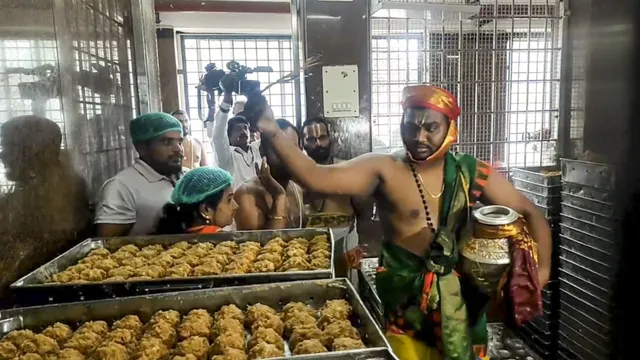- By Shubham Bajpai
- Mon, 10 Nov 2025 06:35 PM (IST)
- Source:JND
In a major development, the authorities have unravelled a Rs 50 lakh money train in connection with the adulteration ghee supplied to Tirumala Tirupati Devsthanam (TTD) for the preparation of laddus, an issue that made headlines last year after Andhra Pradesh CM Chandrababu Naidu made shocking claims of the presence of animal fat in the ghee.
According to a report by NDTV, the alleged money was given to YV Subba Reddy's personal assistant, K Chinnappanna. Reddy. Back then, Reddy was a Lok Sabha MP and the chairman of the TTD.
Chinnappanna allegedly got the money in cash through hawala agents linked to Premier Agri Foods Pvt Ltd, based in Uttar Pradesh.
Chinappanna got the money in two trenches, one of Rs 20 lakh from Aman Gupta, a Delhi-based agent, and the second from Vijay Gupta, a senior executive of Premier Agri Foods.
NDTV cited sources reporting that both transactions were made near Delhi's Patel Nagar Metro Station.
Last year, the Supreme Court formed a committee to investigate the alleged adulteration. The team included the officials of CBI, the state police force, and food safety department.
The team submitted a report stating that there were several instances when the four dairies supplying the ghee manipulated documents and prices to win tenders
They found out that over 60 lakh kg of impure ghee, worth over Rs 240 crore, reached the temple.
This ghee was routed into the temple by Sri Vyshnavi Dairy Specialities, which supplied adulterated ghee worth Rs 133.12 crore, Malganga Milk & Agro Products, which supplied spurious ghee worth Rs 73.18 crore, and AR Dairy Foods, which supplied worth Rs 1.61 crore adulterated ghee.
A significant portion of this ghee came from Bhole Baba Organic Dairy Milk Pvt Ltd, based in Uttarakhand's Roorkee.
The firm never purchased milk but used palm oil and other chemicals such as mono glycerides, acetic acid ester, lactic acid, beta carotene, artificial ghee essence, etc, according to a report by The Times of India.
The CBI-led probe team also indicated that despite the 2022 report of the Mysuru-based Central Food Technological Research Institute confirming adulteration, supply continued till 2024.

